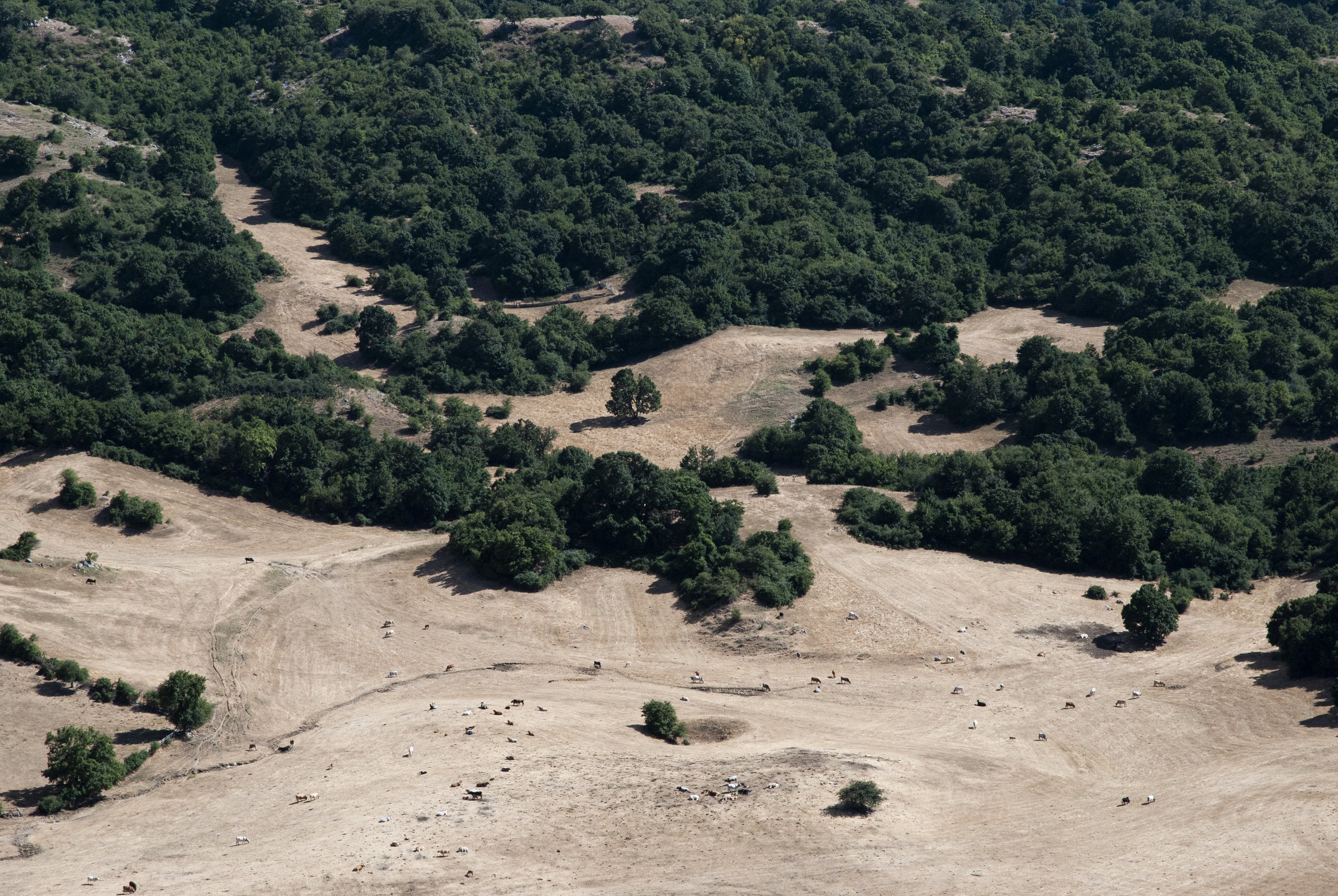transitioning a landscape
a research and stakeholder engagement initiative to design a multi-year landscape laboratory in the evolving arid prairies of monti prenestini
the arid prairies are a rich and biodiverse landscape where processes of agricultural land abandonment are making it increasingly hard to preserve some of its environmentally protected features
location
liminal embassy monti prenestini
lazio, italy
challenge period
june 10 – july 26 / 2024
11 days on the ground
challenge champions
status
challenge team complete

Transitioning a Landscape is a research initiative focused on the shrinking arid prairies of Monti Prenestini. The challenge aims to uncover how local communities can benefit from ways of stewarding the land that are coherent with changing social priorities, environmental conditions, and technologies. Members will conduct intensive stakeholder engagement and physical contact with the landscape in order to produce a project report. This document will register the team’s understanding of the arid prairie landscape and collect useful case studies. Participating members will also hypothesize a multi-year fieldwork laboratory between Liminal and key stakeholders engaged during the time on the ground. The laboratory will be conceived as a space to experiment with new stewardship practices that offer concrete benefits for local communities. The aim of this laboratory shall be to test viable, scalable solutions of land management that have clear incentive alignment in order to catalyze a broader re-engagement in the territory.
This is the first of a series of challenges that deal with agricultural land abandonment, a nationwide phenomenon that has been on the rise throughout the last century of urbanization. The first phase of the fieldwork laboratory that will be hypothesized during this challenge will see its implementation this fall through Shaping the Ground. It will take the form of an ephemeral, participatory act of land stewardship that can awaken local and regional interest in the potentials uncovered during Transitioning a Landscape.
-
Agricultural land abandonment in Italy has led to one of the greatest natural reforestation events since the collapse of the Roman Empire, particularly in disadvantaged areas that have high slope classes and poor soils, or which were difficult to mechanize with 20th century technology. This has led to important gains from an ecological and biodiversity perspective at the larger scale, which are particularly relevant in light of risks posed by climate change. However, it has also led to the loss of a great diversity of local stewardship practices, historically significant landscape features and immaterial culture. The lack of economic incentives at the local level and the distance of more centralized state management entities with sclerotic internal bureaucracies has led in many areas to a “do nothing” approach sometimes called environmental conservation. But conditions on the ground are always more complicated. As the arid prairies of Monti Prenestini shrink with the advancement of young forests, they threaten the rich biodiversity that has developed over centuries in this anthropic landscape, a portion of which is protected by the European Union’s Natura2000 network. But with the decline of grazing practices that gave rise to this element of the landscape, few viable avenues remain even for conservation-driven strategies.
Transitioning a Landscape will employ a first principles approach in order to get to know the environmental history of Monti Prenestini’s arid prairies, and imagine what their future might look like. It will depart from the understanding that land stewardship is an inevitable feature of geographies shaped by millenia of human civilization, and that even “doing nothing” during an age of continental deindustrialization is a loaded attitude in itself. The challenge will investigate the ways in which local communities can be a more active, financially incentivized part of the processes at play in their territory, and the degree to which this can be synergistic with larger national and European policymaking. Most importantly, the challenge will operate from the premise that the landscape is always in motion, and that our cultural identity is closely tied to this process.
expected outputs
preliminary report on the environmental history of monti prenestini’s arid prairies, relevant policy overlays in the area, stakeholder perspectives and relevant case studies
project proposal for a fieldwork laboratory within the area of interest, including a 5-year phase plan and short term recommendations for the shaping the ground team.
partners
SDG areas
11. sustainable cities and communities
13. climate action
15. life on land
team status
challenge team complete
useful skills & backgrounds
mapping, stakeholder engagement, business modelling, design (built environment disciplines), GIS, rhino, photoshop, indesign, photography, italian
landscape architecture, territorial planning, ecology, eu policy, agronomy, agtech/precision agriculture, environmental history, geography, pedagogy, graphic design
perks
lodging (shared rooms)
national transportation (rail)
local transportation
workspace with wi-fi
welcome dinner
farewell dinner
conditions on
the ground
The challenge will take place in small and underserved towns with spotty Wi-Fi connections and no AC. Members are expected to embrace life in these towns and remain in the region during the weekly rest day (usually Sundays). Members will likely share rooms with other participants.
Participants in this challenge will spend a large portion of their time on the ground outdoors in early july. This includes going on long mountainous hikes, and spending long days doing engagement that many times requires live translation.
schedule preview
remote
june 10 – june 21
calls & independent research
june 10 – june 14
2 calls
introductions
challenge overview
subdivision of tasks
literature review
base file compilation
june 17 – june 21
2 calls
literature review
base map creation
landscape transition precedents
onsite workflow coordination
on the ground
july 2 – july 12
full days
monti prenestini
july 2– july 6
encounters with stakeholders
landscape scoping
transition transect
brainstormings
july 7
rest day
july 8 – july 12
field research synthesis
fieldwork laboratory planning
site & partnership hypothesis
research and project dossier outline
planning for remote phase
remote
july 15 – july 26
calls & indipendent research
july 15 – july 19
2 calls
research report development
project proposal development
july 22 – july 26
2 calls
research report finalization
project proposal finalization


